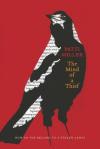When I decided to write this sub-series, the genre that nearly stopped me before I started was crime, because I knew I’d have to do it! CRIME is so-o-o big that it’s hard to know where to start … so, I’m just going to dive in, share a select number of ideas, and let the rest of you, as you always do, fill in the gaps.
Crime, as you know, is not a key genre for me, but over the years, for one reason or another, I’ve read a number of crime books, ranging from cosy crime to police procedurals, from classic crime to true crime, from rural noir to literary crime, from – well, you get the picture. In other words, for someone not drawn to crime, I’ve read and, I admit, enjoyed more than I would have thought when I started this blog. I have also written separate posts about Sisters in Crime Australia and their Stiletto awards.
Festivals
Crime, being the popular genre it is, features regularly at writers festivals around Australia. It would be rare, methinks, to attend a festival and not find at least one panel devoted to crime. I’ve written on a couple myself – a crime panel convened by Angela Savage at the 2020 Yarra Valley Writers Festival, and a true crime one at the 2019 Canberra Writers Festival.
But, there are also festivals devoted specifically to crime, including these three held or to be held in 2021:
BAD Sydney Crime Writers Festival
To be held from 2-5 December, 2021. As far as I can tell, this is an annual festival that started around 2017. It “explores what crime can tell us about human beings today and in the past”, or, what BAD describes as “”the dark side that is part of being human”. They suggest that Sydney is particularly appropriate “because it was founded by convicts and their guards” and “has been significantly affected by crime and corruption for much of its history”. On the 2017 festival page, they argue that “you cannot understand this city completely without its vital criminal subculture”. The 2021 festival will feature “some of the biggest names in crime fiction, true crime and social justice advocacy”, including Jane Harper, Michael Robotham, Garry Disher, Chris Hammer, Xanthé Mallett, as well as Melissa Lucashenko, Robert Drewe, Richard Glover, Tony Birch, Larissa Behrendt and Stan Grant. This is a face-to-face festival, but all sessions will also be Zoom-ed.
Rural Crime Writing Festival
Held as an online festival on 12 June 2021, by the New England Writers Centre. Calling it the “very first of its kind”, they hope to repeat it. Participants included Emma Viskic and Yumna Kassab. Carmel Shute of Sisters in Crime convened a panel which discussed “the rewards of literary awards”. Would love to have heard that.
Terror Australis Readers and Writers Festival: CSI: Tasmania Digital Festival
To be held as an online festival on 27 & 28 November, 2021. Described as Tasmania’s International Crime and Mystery Literary Festival. Like BAD, TARWF, which is located in the Huon Valley, offers a range of live, live-streamed and virtual events throughout the year. CSI Tasmania is their second festival, following their successful Murder She Wrote festival in 2019. It features Australian writers like Gary Disher, Sulari Gentil, Candice Fox and Anita Heiss, and international writers like Val McDiarmid and Ann Cleeves. TARWF’s founder and current director is crime writer L.J.M. Owen, and the organisation is volunteer-run.
Prizes
Crime is also a genre that seems well served by awards and prizes.
- Danger Award, offered by BAD. An annual award, established about 2018, I think, for “the best book, TV series, podcast or film about Sydney crime” (so not “just” books).
- Davitt Awards, offered by Sisters in Crime Australia, since 2001. Prizes are offered in several categories for writing by women.
- Ned Kelly Awards, run by the Australian Crime Writers Association and established in 1996. They offer prizes in several categories, including true crime, debut crime and YA crime.
- Scarlet Stiletto Awards, also run by Sisters in Crime Australia, since 1994. This award is limited (devoted) to crime and mystery short stories “written by Australian women and featuring a strong female protagonist”. Clan Destine Press has now published eleven collections of winning stories.
AWW Challenge
Many of you know that I’ve been involved in the Australian Women Writers Challenge pretty much from its inception. It collects on-line reviews, mostly by bloggers and GoodReads readers, of books in all forms and genres written by Australian women. And crime, of course, is a big genre. An important aspect of the challenge is our Book Review database, which you can search via the Books Reviewed search page. Clicking this link, however, will take you immediately to a list of the reviews posted for over 950 crime books by Australian women writers. It’s quite a database now.
Finally …
If you’ve been paying attention, and I’m sure you have, you will have realised that there are many organisations in Australia devoted to supporting crime, including the Australian Crime Writers Association, Sisters in Crime Australia, BAD, and publishers like Clan Destine Press.
And, just to round it all off, this article in The Conversation provides a neat history of Australian crime – in case you are interested.
Do you read Crime? If so, would you care to share some favourites?
Previous supporting genre posts: 1. Historical fiction; 2. Short stories; 3. Biography; 4. Literary nonfiction.















